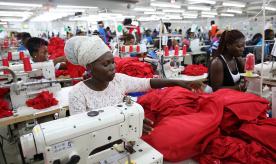He is Professor of Development Economics at Oxford University. His research focuses on economic development and growth, with particular interests in agriculture and structural transformation. His work brings a general equilibrium perspective to issues such as: sectoral differences in productivity; the impacts of agricultural technologies; the role of transport costs in shaping spatial patterns of development; the importance of small firms and self employment in poor countries; and the macroeconomic effects of disease.
Doug Gollin joined Oxford in October 2012 after spending sixteen years on the faculty of Williams College in the United States, where he retains an affiliation. He is a visiting fellow at the Yale School of Forestry and Environmental Studies. He chairs the Standing Panel on Impact Assessment of the CGIAR, a consortium of international agricultural research organizations. He also works with the International Growth Centre and a number of NGOs involved in policy-oriented research on development.
He is currently a Managing Editor of the Journal of African Economies and an Associate Editor for the Journal of Development Economics and Oxford Development Studies.
Doug Gollin holds an AB degree from Harvard University and an MA from Yale University. He received his PhD in economics from the University of Minnesota in 1996.










